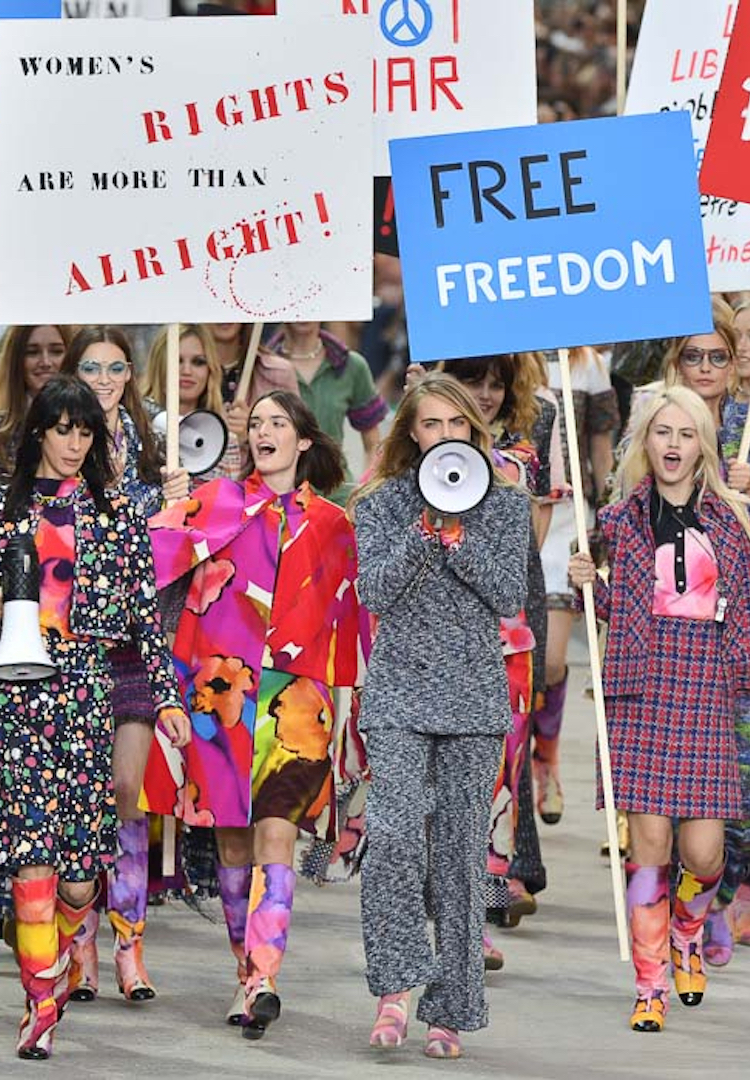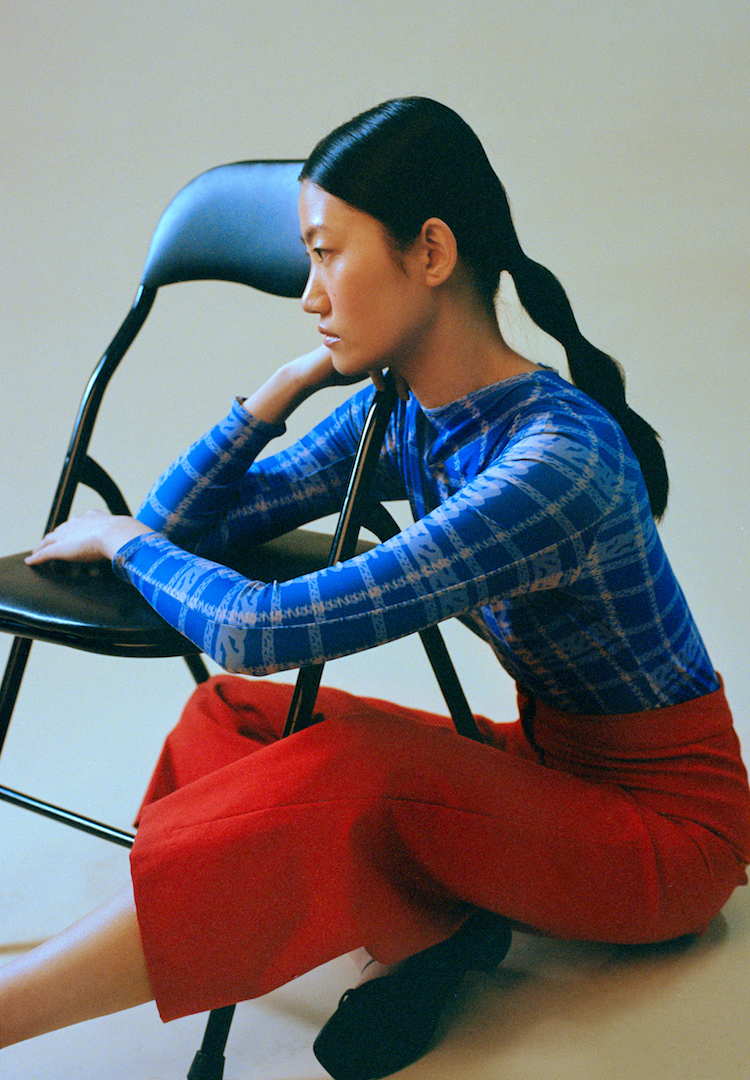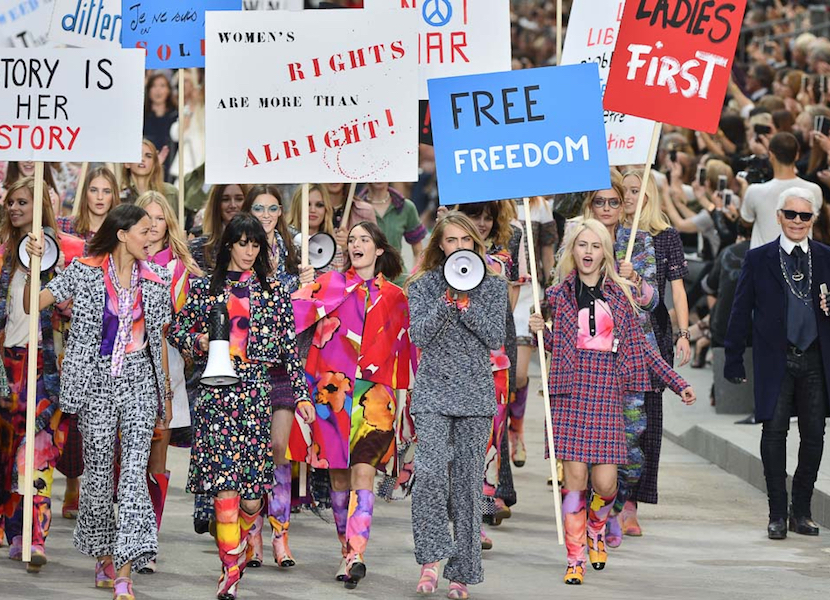Do we really need the fashion industry to weigh in on political and humanitarian issues?
IMAGE VIA BURO 24/7
WORDS BY ROSANNA WATTS
This is going to take more than a single black square.
If you’ve been on Instagram at all this past week, you’d know many of our beloved brands are taking to their socials to show their support for the Black Lives Matter (BLM) movement. The BLM movement, founded in 2013, seeks to eradicate white supremacy and end violence towards people of colour.
While many are applauding brands for their digital support of BLM, others have called them out for engaging in performative activism. This controversy got us wondering whether fashion labels and the fashion industry itself are responsible for addressing social, political and humanitarian issues and, if so, how should they go about it?
With great power comes great responsibility
Fashion’s power to influence is great and undeniable and so too is its link with politics and humanitarian issues. According to Dayna Simpson, Associate Professor in the Department of Management at Monash University, “Fashion is a statement, it has a political role… and is a way to highlight the consciousness of the society at that time.”
We’ve seen this in action, when stars wore black to the 75th Golden Globes to show their support for the Time’s Up movement and victims of sexual assault. On the runway, designers are increasingly incorporating political messages into their collections, like when Tommy Hilfiger used white bandanas as part of the #TiedTogether movement, which sought to highlight human unity and inclusivity.
But we all know nothing says a political-fashion statement quite like a slogan tee. While fast-fashion brands have been providing the masses with their political chest statements for some time now, the trend hit the high fashion scene in 2017 with Dior’s We Should All Be Feminists tees.
But, beyond influencing our OOTDs and fashion trends, large brands and conglomerates could use their economic power to influence public policies and decision making. Advertising and marketing expert Dr. Bree Hurst from the Queensland University of Technology believes they should. “Companies, particularly multinational companies, have considerable power thanks to their global supply chains and reach,” she says.
Outside the world of fashion, this can look like hundreds of CEOs publicly speaking out against laws that discriminate against LGBTQ+ people. Within the world of fashion, change is often focused on industry-related issues. We saw this in 2011 when in response to the Greenpeace campaign Detox My Fashion, many apparel brands made a commitment to eradicate hazardous chemicals from their manufacturing processes.
And more recently, we’ve seen industry leaders band together as part of the Rewiring Fashion movement, which hopes to make some sustainability-focused changes to the industry, like going seasonless and eradicating discount culture.
But given the influence fashion has on society, shouldn’t brands be doing more towards social issues?
The short answer? Yes, the fashion industry should take on a high degree of social responsibility. The longer answer, however, involves understanding the industry’s many social and environmental downfalls.
Firstly, the fashion industry continues to be fraught with violations of labour rights. “We’re aware that there is a lot of labour in clothing supply chains and they’re not working under good conditions, potentially under modern slavery conditions which covers forced labour, child labour and involves largely undocumented work,” explains Dayna.
There are reports of gender violence against supply-chain workers for big brands such as H&M and GAP and instances of Australian brands like Peter Alexander and Myer failing to pay their garment workers a living wage. The fashion industry is also a major contributor to the climate crisis. We’ve spoken about this at length, so we won’t reiterate the stats here.
But recently, as people take to the streets for the BLM movement, it’s the industry’s lack of inclusivity and representation of people of colour that has come under the most fire, and for good reason. A quick scan of the campaigns of most fashion brands reveals that the majority of models cast are white, and accusations of discrimination are rife within the fashion industry.
You can see why the fashion industry might need to take on some Corporate Social Responsibility (CSR).
A quick explainer on CSR
Essentially, CSR means the consideration a brand, business or corporation makes to social, environmental and humanitarian concerns within their own supply chains.
But some brands are taking it one step further than their own business frameworks and are actually engaging in something called Political Corporate Social Responsibility (PCSR). This extends beyond a company’s own operations and involves them engaging in wider social and political issues.
This can help explain why the socials of our fave fashion and beauty labels might suddenly include black squares for #blackouttuesday and pictures of the Aussie bushfires, as they pledge their support. Researchers are calling this sort of action corporate activism – it’s essentially a brand or company’s version of marching, donating and signing a change.org petition.
So, to recap, CSR is the commitment a brand makes to social responsibility in its supply chains. Tag on the word political and you’re now looking at what a brand says and does about wider social and political issues. And should you wish to describe these actions, you can use that nifty new phrase; corporate activism.
But why have some people challenged recent demonstrations of corporate activism?
Take a look at the comments on some brands’ BLM posts and you might see them being called out for ‘virtue signalling’ or ‘performative activism’. These both suggest that a person, or in this case a brand, is demonstrating support for a cause to make itself look better or because not doing so would be bad for PR.
If that’s the case, how can you tell if a brand is being genuine with its activism? Well, compare its usual actions to its claims; if the two don’t add up, you’re likely witnessing performative activism.
For example, some Aussie and New Zealand brands like P.E Nation and Georgia Alice have taken to IG to post their support for BLM, but have been called out in the comments for having a poor representation of POC in their campaigns.
Some might argue that raising awareness for a cause can only be a good thing. Abas Mirzaei, the Senior Lecturer in the Department of Marketing at Macquarie University thinks so. “If the ultimate outcome of woke marketing is a greater support in the fight against social injustice, a greater platform for debate on social issues, then that’s a positive outcome for the society, regardless of the motivations.”
But those who directly suffer from these issues have said that it can be traumatic to see a brand fail to take their plight seriously, or worse, use it to boost its PR or brand perception.
Okay, so beyond tokenistic gestures, are there any other concerns with corporate activism?
Brands are acutely aware that consumers are increasingly considering social and political commitments in their purchasing process. “Recent research tells us that almost a third of customers will deliberately buy from companies whose political and social values match their own,” says Bree.
But knowing that political and social responsibility can be good for a company’s sales, some have taken to criticising brands for engaging in ‘woke washing’. Woke washing is when a brand uses social issues as an advertising tactic which, in turn, directs customers’ attention away from any unsustainable and unethical business practices.
“It’s really important for brands to put their money where their mouth is… so, if they say they’re going to do something, they need to do it. This also means that they need to look at their own practices, including their supply chains, and ask whether or not they are complicit because of their actions,” says Bree.
So, although it might seem like only a good thing for a brand to be taking a stand on a particular issue, concerns arise if its own operations don’t match up. When Australia suffered its unprecedented bushfire season this past summer, we saw a lot of brands donating profits and creating specific clothing lines to support bushfire relief.
Fast-fashion giants like Pretty Little Thing and its parent company Boohoo even made collective donations of $300,000. While, of course, this is great to see, this sort of display of PCSR and corporate activism is not without its critics.
Considering the fast-fashion industry’s sizable contribution to climate change, some say it’s rather ironic for a leading fast-fashion brand to support those affected by a climate-change-related disaster. The same is said when brands donate to movements like BLM and yet exploit people of colour in their supply chains.
The other concern is that using PCSR in a brand’s campaign can seriously boost brand loyalty, sales and profits, meaning a brand can actually profit off of the marginalisation and plight of certain groups. “Making a T-shirt in a moment, that just capitalises on a movement, but brands need to consider what they’re doing in their supply chains and in their systems,” says Dayna.
Unfortunately, by purchasing from a brand solely because of its PCSR claims, we might actually be supporting the systems that exacerbate the very social issues we thought we were helping to solve.
So what should brands do, surely not nothing?
Although it may seem like a damned if you do, damned if you don’t situation, PCSR has the potential to create meaningful social change. “Despite the common criticism labelling brands’ activism [as] woke washing, I believe it is important for brands to not lose their motivations and continue their “getting woke” until they’re experienced,” says Abbas.
When it comes to avoiding performative activism, however, it would be good if brands acknowledged and even apologised for their lack of past action. And if they’re only just speaking up now, it’s really important they make good on their word by being more active in the future.
It’s no secret that the fashion industry needs to make long-term commitments to cleaning up their business structures across the board. And until that happens, it’s likely many corporate activism attempts will be met with controversy and questioning.
What does this mean for the future, and for us consumers?
Seeing as consumers clearly have a role to play in this, we should keep an eye out for brands who might be using CSR or PCSR in a woke-washing way and do what we can to hold them accountable to their claims.
Social media is an easy way to do this – share posts, call them out when necessary, direct message brands with your queries and make your thoughts known in their comment sections. And, if you can afford it, support ethical and sustainable brands who already do a lot when it comes to social and political responsibility.
Only time will tell if this is the start of a new businesses-led model of social change, or just a wave of marketing that helps brands stay relevant with consumers. But if corporate activism and PCSR see brands take some real, meaningful action, then it seems that addressing their own CSR and business models is likely the best place to start.
Although a little complex, we found this to be a really interesting issue. And, because we thought you’d agree, we put together a list of the articles that informed our discussion, in case you want to do a little extra reading:










